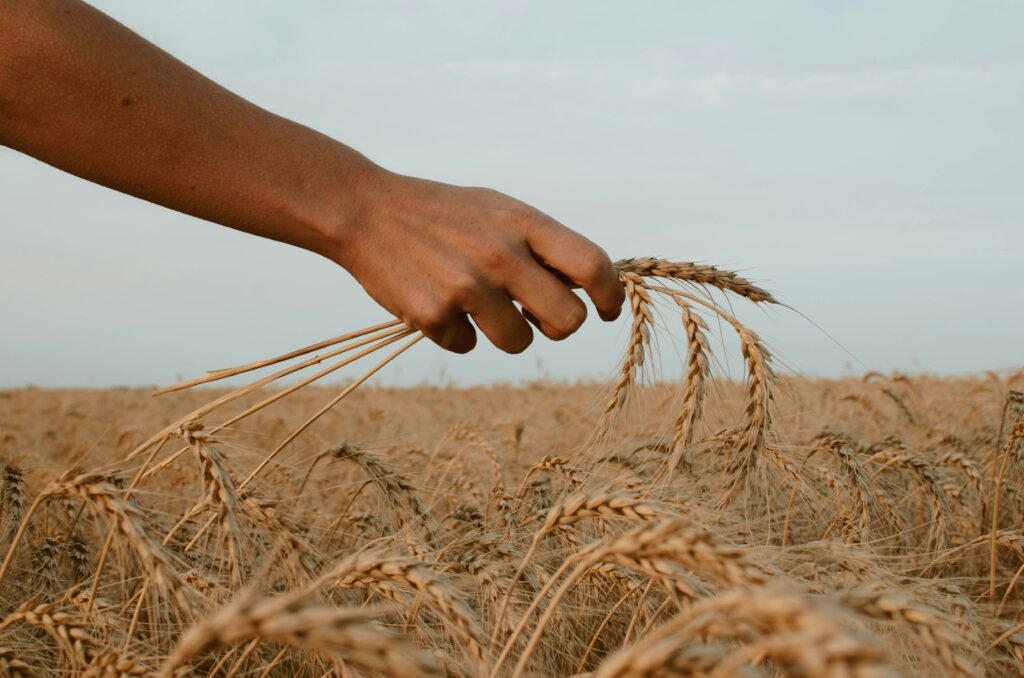
Part 1: Background | Part 2: Loyal Love | Part 3: Chance | Part 4: Abundance | Part 5: A Plan | Part 6: Approach
And now comes what appears to us to be the riskiest part of the whole story. But as we’ve noted, Naomi has a strong foundation for her plan, plenty of evidence that it’s going to turn out well for the widows.
Ruth follows Naomi’s instructions to the letter. She waits until after Boaz has eaten—that will make him contented and sleepy—and after dark, so that their conversation will be private. Without waking him, she lies down at his feet and covers herself with a portion of his covering, perhaps a blanket or a robe (Ru 3.7). All this makes it likely that he will wake up at some point during the night.
And so he does (Ru 3.8).
Of course, in the dark, he doesn’t know who she is, so he asks.
This is the crucial moment. Ruth must phrase her reply precisely as Naomi has instructed her to.
“I am Ruth, your maid. So spread your covering over your maid, for you are a close relative” (Ru 3.9).
Did Ruth know the cultural significance of what she was saying? Probably, but we’re not told. But Naomi certainly does. This is a claim of redemption. It is a legal claim for Boaz to be to Ruth as the law provides, following the example of God himself, who dwells under the wings of the cherubim in the Tabernacle. It’s an assertion of her right, under Naomi, to have their property redeemed, their debts paid, and their line secured through the birth of a male heir. It’s a proposal of marriage.
She is asking him to be the refuge that she has sought from Yahweh (Ru 2.12).
These days we would say that that’s a Big Ask.
Boaz indicates immediately that Naomi’s expectations are well founded. First, he expresses openness to the relationship. In an endearing response, he says that marrying Ruth would be a step up for him—that she is the kind of woman who could have any man she wanted, specifically younger men (Ru 3.10)—another indication that Boaz is getting, as we would say, long in the tooth. “The delicate interplay here suggests that Boaz was significantly older, and that Ruth was not only an admirable but a desirable younger woman” (BRC).
He calls her action “kindness”—and there’s that word hesed again. Seeking relief from a near relative, though he is older, he sees as loyalty to Israel’s Law and Israel’s God. Boaz is surprised—and pleased.
“Ruth’s former act of devotion [‘better than the first’] was her decision to remain and help Naomi. The latter act of devotion is her decision to marry Boaz to provide a child to carry on her deceased husband’s (and Elimelech’s) line and to provide for Naomi in her old age” (NET).
Boaz adds that Ruth is reputed among “the people of the gate”—probably the town’s leaders— as “a woman of excellence” (Ru 3.11).
In calling Ruth this, the same word used of Boaz [Ru 2.1]), Boaz “uses a term translated ‘mighty’ when describing a warrior, or ‘wealthy’ when describing an ordinary person. It suggests special attainment in the area of endeavor being discussed. Used of Ruth, it affirms that the whole community sees her as an ‘ideal bride’ or a ‘bride worth winning’ ” (BRC).
They will make quite a pair.
But there’s a hitch (pun absolutely intended).
Apparently unbeknownst to Naomi, there’s a closer relative, and he has, as we say in contractual language, “right of first refusal.” “The responsibility of redemption [Ru 3.12] would go first to the deceased person’s brother, then uncle, then cousin, then another ‘close relative’ (Lev 25:48–49). The exact relationship between Boaz, the other relative, and Elimelech is unclear” (FSB). Boaz says he’ll look into that in the morning. By saying that, he’s confirming his interest.
He’ll confirm it in two more ways before morning.
To be continued.
Photo by Paz Arando on Unsplash

Leave a reply. Keep it clean.